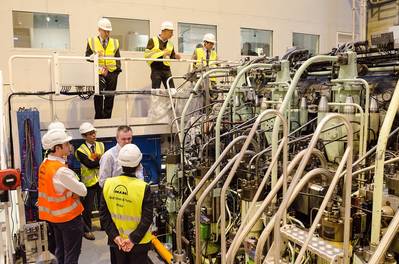MAN Demonstrates Two-Stroke Methanol Engine Concept
MAN Diesel & Turbo successfully demonstrated its ME-LGI concept engine in front of customers and partners at its Diesel Research Center in Copenhagen on March 17th, the company announced today.
“A number of years ago we identified the need to develop an engine that could run on more environmentally-friendly, competitively-priced fuels as an alternative to MDO/MGO," said Vice President and Head of R&D, Søren H. Jensen. "We believe the ability of the ME-LGI engine to run on sulfur-free fuels offers great potential. Methanol carriers have already operated at sea for many years. With a viable, convenient and economic fuel already on-board, exploiting a fraction of the cargo to power a vessel makes sense.”
For the purposes of the event, the company rebuilt its 50MX test engine to an ME-LGI unit, which was demonstrated to representatives from Westfal-Larsen, Marinvest, Waterfront Shipping/Methanex, MES, HHI-EMD, MOL, and Minaminippon.
To date, MAN Diesel & Turbo has received orders for 7 × ME-LGI engines – a mixture of 7S50ME-LGI and 6G50ME-LGI variants – from Mitsui O.S.K. Lines, Marinvest and Westfal-Larsen.
The very first engine will be produced by Mitsui Engineering & Shipbuilding Co., Ltd. (MES) for a vessel currently under construction by Minaminippon Shipbuilding Co., Ltd. for Mitsui O.S.K. Lines, Ltd.
MAN Diesel & Turbo has previously stated that it is already working towards a Tier-III-compatible ME-LGI version that can meet IMO NOx limits with the aid of secondary measures.
Methanol as a ship fuel does not contain sulfur and is liquid in ambient air conditions, which makes it easy to store aboard ships. For ships operating in IMO Emission Control Areas (ECAs), methanol is a solution to the demands of sulfur-emission legislation.
A further advantage of methanol is its ability to be stored in normal, unpressurized tanks. As delivery by train, truck and/or ship is already in place in many areas globally, establishing and expanding the existing methanol infrastructure is feasible, even for individual ships operating in remote areas.
In contrast with the ME-GI engine where fuel is injected in its gaseous phase, the MAN B&W ME-LGI engine is the dual-fuel solution for low-flashpoint liquid fuels. The ME-LGI design overcomes the challenge of low-cetane-number fuels – such as methanol – whose self-ignition quality is characteristically poor, using the well-known ME-GI principle of pilot injection of MGO or HFO. The ME-LGI’s operation principle and safety concept are similar to those of the already accepted ME-GI concept.

















